





Inflyuvak
Application instruction:
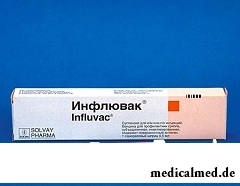 Inflyuvak – the trivalent subunit inactivated vaccine for prevention of flu.
Inflyuvak – the trivalent subunit inactivated vaccine for prevention of flu.
Form of release and structure
Dosage form – suspension for intramuscular and hypodermic introduction: transparent colourless liquid (on 0,5 ml in one-time syringes (with a needle) with a capacity of 1 ml, on 1 syringe in holders the cardboard, 1 holder in a pack cardboard).
In 1 dose of a vaccine (0,5 ml) on 15 mkg of HECTARE (hemagglutinin) of the following virus strains:
- AND (H3N2) *;
- AND (H1N1) *;
- B*.
* after the name of type the name of the strain recommended by World Health Organization for the current epidemic season of flu is specified.
Additional components: phosphate sodium a dihydrate, potassium dihydrophosphate, sodium chloride, chloride magnesium hexahydrate, Calcii chloridum a dihydrate, sodium citrate, potassium chloride, formaldehyde, sucrose, polysorbate 80, STAV, water for injections.
Indications to use
Inflyuvak is applied to prevention of flu at adults and children 6 months are more senior. Especially, vaccination is recommended to the following categories of the population belonging to risk group of incidence of flu:
- Elderly people are aged more senior than 65 years;
- Children and teenagers aged from 6 months up to 18 years who receive acetylsalicylic acid for a long time owing to what they under the influence of an influenzal infection are subject to risk of development of a syndrome Reja;
- Patients with a chronic renal failure;
- Patients with cardiovascular diseases of any etiology;
- People with diseases of a respiratory organs, including with bronchial asthma;
- Patients with chronic disturbances of metabolism, including patients with a diabetes mellitus;
- Patients with immunodeficient diseases and the patients receiving radiation therapy, cytostatics, corticosteroids or immunodepressants in high doses.
Contraindications
- Hypersensitivity to components of a vaccine or chicken protein;
- To hypersensitivity reaction to substances which can contain in residual quantities – to gentamycin, HAVING BECOME, to formaldehyde, polysorbate-80.
At acute diseases and an exacerbation of chronic diseases vaccination should be postponed until improvement of a state.
At not heavy acute respiratory viral infections and acute intestinal diseases immunization can be carried out at once after normalization of body temperature.
Route of administration and dosage
Inflyuvak enter intramusculary or deeply subcutaneously. The injection should be carried out carefully to avoid hit of drug in an intravascular bed. It is strictly forbidden to enter a vaccine intravenously!
Immunization is carried out annually to the autumn period.
The recommended doses:
- Adults and children are more senior than 3 years – 0,5 ml once;
- Children from 6 months to 3 years – 0,25 ml once.
The children who are not vaccinated earlier are recommended to enter a vaccine with a 4 weeks interval twice.
Rules of introduction of a vaccine:
- To heat a vaccine to room temperature;
- Just before an injection to stir up the syringe;
- To remove a protective cap from a needle;
- To remove air from the syringe, holding it in vertical position a needle up and slowly pressing the piston;
- To enter a vaccine intramusculary or deeply subcutaneously. At introduction children of a dose of 0,25 ml should stop the movement of the piston of the syringe while its internal surface reaches bottom edge of the fixer of a needle.
Side effects
The side reactions revealed during clinical trials:
- Central nervous system: often – a headache *;
- Musculoskeletal system: often – an arthralgia *, a mialgiya;
- Local reactions: consolidation, morbidity, swelling and reddening *, ecchymomas;
- Others: the strengthened sweating *, fervescence, a fever, an indisposition, fatigue.
* these reactions usually take place independently within 1-2 days and do not demand special treatment.
The side effects revealed during post-marketing observations:
- Central and peripheral nervous system: paresthesias, neuralgia, neuritis, encephalomyelitis, spasms, syndrome to Giyena-Barra;
- System of a hemopoiesis: tranzitorny lymphadenopathy, tranzitorny thrombocytopenia;
- Cardiovascular system: a vasculitis (seldom or never can be followed by a tranzitorny renal failure);
- Dermatological and allergic reactions: generalized skin reactions, including itch, urticaria or nonspecific rash, manifestations of allergic reactions; in rare instances – an acute anaphylaxis, a Quincke's disease.
Special instructions
All means necessary for carrying out emergency treatment of an acute anaphylaxis, including glucocorticosteroids, adrenaline or Epinephrinum have to be provided in an inoculative office.
1 dose of a vaccine should not contain more than 1 mkg of ovalbumin.
Patients can have an insufficient response to vaccination with immunosuppression (both exogenous, and endogenous).
At the patients who underwent vaccination by Inflyuvak obtaining false positive results of the serological tests which are carried out by the ELISA method (immunoenzyme method) such as definition of antibodies against hepatitis C, HIV (HIV1), the T-cellular lymphotropic virus of the person (HTLV1) is possible. Laboratory diagnosis by the Western blotting method allows to exclude false positive results of these tests.
Inflyuvak does not exert a negative impact on the speed of reactions and ability to concentration of attention.
It is necessary to inform the attending physician of all cases of postvaccinal reactions.
Medicinal interaction
Inflyuvak it is possible to apply along with other vaccines, but it is necessary to enter them different syringes into various body parts. However in this case it is impossible to exclude probability of strengthening of side effects.
The immune response on vaccination can be lowered at the patients receiving immunodepressive therapy.
It is not necessary to take a vaccine from the syringe and to apply it in mix with other medicines.
Terms and storage conditions
To store and transport at a temperature of 2-8 ºС in the place protected from light. To protect from children. Not to freeze. If necessary it is possible to transport drug at a temperature of 25 ºС, but no more than 24 hours.
Period of validity – 1 year. The termination of a period of validity of a vaccine is always considered on June 30 the year following after a year of release.
The weight of a human brain makes about 2% of all body weight, however it consumes about 20% of the oxygen coming to blood. This fact does a human brain extremely susceptible to the damages caused by shortage of oxygen.

Cold, puffiness of a nose, itch, the watering eyes - characteristic symptoms of the allergic rhinitis resulting from hit and...
Section: Articles about health
The unpleasant feelings connected with spring breakdown are familiar almost to each of us. Often happens that in March-April on the person weakness leans: he suffers from drowsiness, complains of bad mood, loss of interest in life and failures in affairs....
Section: Articles about health
For the city dweller the fitness is the most convenient sport. It is enough to acquire the subscription to the gym to get access to various apparatuses and an opportunity to train under the leadership of the experienced consultant. Many consider fitness the best way of maintenance of physical shape and receiving dynamic loads which the people occupied preferential with brainwork so need. Nevertheless, representations of most of consumers of similar services about специф...
Section: Articles about health
Each failure in work of bodies and systems of a human body is, as a rule, shown by the whole complex of symptoms. In particular, N...
Section: Articles about health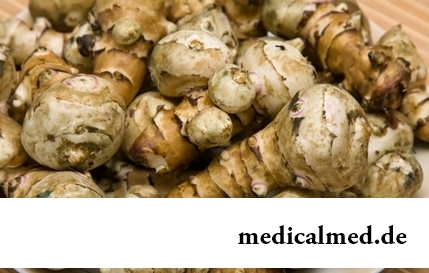
At this plant there are a lot of names: tuberiferous sunflower, Jerusalem artichoke, solar root, earth pear. Contrary to popular belief, it is not an exotic plant at all. The wild girasol grows in a midland of Russia practically everywhere: at the edges of roads...
Section: Articles about health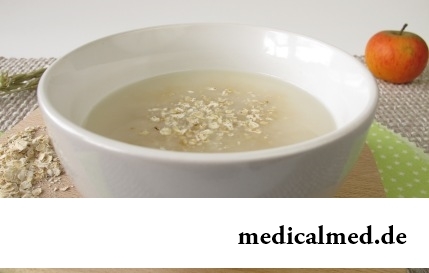
The main role in development of a peptic ulcer of a stomach and duodenum the bacterium Helikobakter plays pilor. Activity and the strengthened reproduction of this microorganism lead to weakening of protection of mucous membranes and their erosive damage. Displays of an illness seriously reduce quality of life: patients regularly test attacks of severe pain, heartburn, nausea. On this background also psychoemotional malfunctions develop: a kidney-vetch, as a rule, shows an acrimony, ча...
Section: Articles about health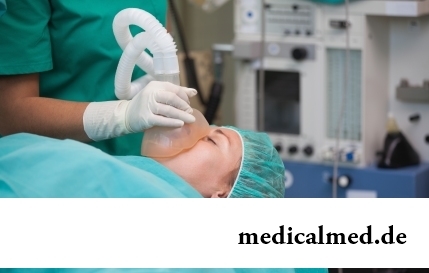
History of use of an anesthesia during operations contains more than 160 years. Annually in the world hundreds of thousands surgical вм are carried out...
Section: Articles about health
Almost each of us during life faced dissatisfaction with own body. At such moments, as a rule, we begin to shame ourselves, urgently we go on the most rigid diet promising minus of 10 kg in a week, or we exhaust ourselves in the gym to полусм...
Section: Articles about health
The pancreas performs two functions in a human body: release of enzymes without which digestion of carbohydrates, fats and proteins, and a producing hormones is impossible. The most important of them - insulin, is the main participant of carbohydrate metabolism normalizing processes of education and utilization of glucose, the main energy source for an organism....
Section: Articles about health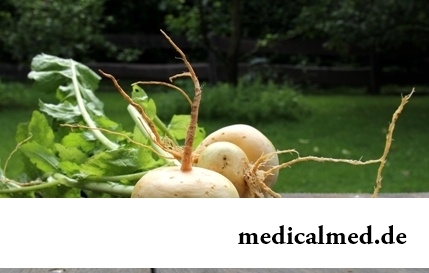
Turnip, radish, horse-radish – once these and other products enjoyed wide popularity at our ancestors, being not only food, N...
Section: Articles about health
New year, wedding, birthday, office party – an occasion to drink at the Russian person will always be. How to reduce a negative impact of alcohol by an organism and to avoid a condition of strong intoxication? The most correct council – to refuse the use spirits напитк...
Section: Articles about health
The words "disease" and "patient" not without reason come from one root – "pain". As a rule, symptoms of illnesses thoroughly spoil to patients life. However from this rule there are exceptions. Some diseases are shown by signs which can cause even positive emotions. It is a pity only that the majority of such illnesses are heavy and incurable....
Section: Articles about health
The brain of the person is studied not one hundred years, but the quantity of the riddles connected with this body increases rather, than reducing...
Section: Articles about health
Quite large number of people adheres to the principles of vegetarian food. But how to be if in a family of vegetarians there are children? Whether it is possible to eat also it the same as to parents, or after all the children's organism is not adapted for the use only раст...
Section: Articles about health
Each of us repeatedly noticed that the people having the same passport age are sometimes not similar on one-years at all. One at the age of 40-45 years already looks almost an old man, and another and in 60 is young, vigorous and full of life. The matter is that the condition of our health depends not on the number of the lived years, and on degree of safety of an organism. This factor also defines biological age of the person....
Section: Articles about health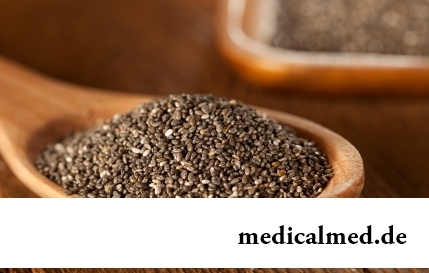
The chia plant, or the Spanish sage, is from South America. The indigenous people of the continent since ancient times used in food it семена:...
Section: Articles about health
Coffee - the tonic loved by many for the invigorating aroma and deep taste. Having the stimulating effect, coffee increases working capacity, promotes concentration of attention, fights against drowsiness and improves mood. Statistically, about 30% of inhabitants...
Section: Articles about health
Among a set of the perfumery and cosmetic goods which are released today the special group is made by the means containing antibacterial components. Such types of gels, shampoos, soaps, creams, lotions and other products are positioned by manufacturers as a panacea from all diseases caused by pathogenic microorganisms. The unlimited and uncontrolled use of similar means becomes result of trustfulness of the buyers hypnotized by persuasive advertizing sometimes. Many spetsial...
Section: Articles about health
What will only not be thought up by persons interested to have a beautiful figure. Here the last innovation – for weight loss needs to be eaten greasy food. Give ра...
Section: Slideshow
In consciousness of our many compatriots idea that folk remedies if are no more effective, than medicinal "chemistry" strongly took roots, then are precisely less harmful. Unfortunately, it is not always fair: some receptions treating...
Section: Articles about health
Scientists always aimed to offer fundamental explanations for medical problems. Their theories formed the basis of modern methods of treatment of the hardest pathologies and helped to save a set of lives. However stories are known also such theoretical constructions, following to which brought to mankind of a trouble and torture, ruined destinies and health of many people....
Section: Articles about health
The depression not without reason is considered one their main troubles of our century: for scientific and technical progress, acceleration of rate of life and a surplus...
Section: Articles about health
Nightmares belong to the most unpleasant frustration. Statistically, they happen at 4% of adults, and almost at 70% of children and teenagers. During a nightmare of people dreams himself in extremely difficult, life-threatening situation. It wakens suddenly, in...
Section: Articles about health
All the known slogan "Protect Men!" arose not from scratch. In a sense, the nature created men much less adapted for vital disorders, than it seems at first sight. Statistically, men are ill more often, than women, have the majority of illnesses heavier and earlier die. The situation is aggravated with the fact that our fathers, husbands, brothers and sons are not always inclined to care for the health. Partly it happens because of unwillingness of t...
Section: Articles about health
The fatigue, sleep debt, disturbances of food, bad mood, vagaries of the weather – all these circumstances badly are reflected in our vn...
Section: Articles about health
Cystitis, or inflammation of a mucous membrane of a bladder, this very widespread disease which, owing to some features of a structure of bodies of urinogenital system, women have approximately four times more often than men. In the main risk group...
Section: Articles about health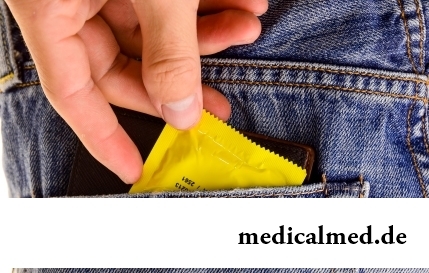
Today about 30 diseases, sexually transmitted are known. Wide circulation of these illnesses is extremely promoted by the dual attitude towards them: on the one hand, most of people know about "shameful" diseases very little and do not aim at receiving detailed and reliable information, considering that such problems personally will never concern them. With another – there are delusions about STD which instill unreasonable confidence that troubles such...
Section: Articles about health
